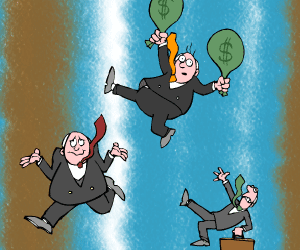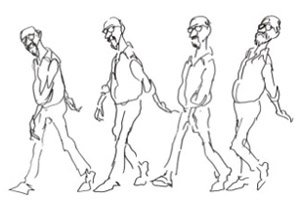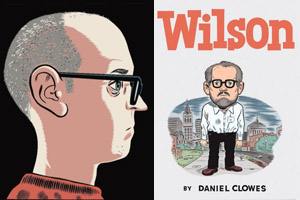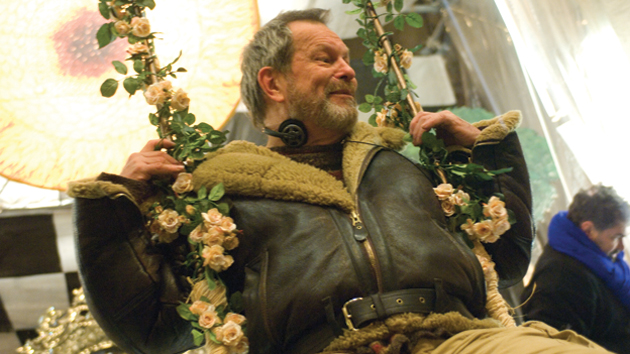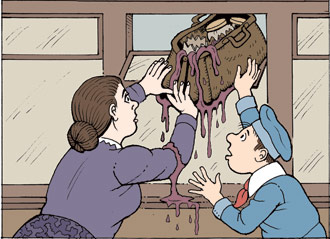
A family mishap from Jaffee's new memoir, Mad Life.
People sometimes introduce cartoonist Al Jaffee as the “retching jackal guy” on account of a repulsive gag he once drew for Mad magazine. “It may be my most successful drawing,” he says of the hurling canine. “It’s utterly silly, I know, but serious people my age are dead.” Silliness, of course, was stock and trade for Jaffee, who created some of the long-lived humor rag’s most-beloved features, from Mad Inventions to Snappy Answers to Stupid Questions to the satirical fold-in back covers—which Jaffee still churns out on deadline at age 89. But his life wasn’t all fun and games. In his new memoir, Al Jaffee’s Mad Life (Mary-Lou Weisman wrote; Jaffee illustrated), he recounts how his immigrant mother spirited off six-year-old Al and his three kid brothers to Zarasai, Lithuania, leaving them to fend for themselves in a world of poverty, religious orthodoxy, and anti-Semitism. “We were hungry all the time,” the cartoonist recalls. Here Jaffee reflects on shtetl life, the golden age of comics, and how he ended up shaping Mad‘s subversive mission. (Click here for a slideshow of Jaffee’s cartoons.)
Mother Jones: So, was Mary-Lou Weisman a reader of Mad?
Al Jaffee: No. Her children knew about it, but she didn’t. She’s an author and a more high-brow literary type. She regarded Mad as a children’s magazine.
MJ: Which it is.
AJ: Yes. It was designed to corrupt the minds of children. And from what I’m gathering from the minds of people all over, we succeeded.
MJ: Well, it certainly affirmed the direction we were going at that age.
AJ: That’s correct. And also, Mad came out at a time when things were looking politically pretty dim, with the McCarthy movement. Senator McCarthy was accusing anyone who had a liberal thought in his mind of being a communist sympathizer. And, of course, the Cold War was in full bloom, so the fact that Mad could come out and in a humorous way criticize American institutions like advertising—I’m sure J. Edgar Hoover of the FBI and the McCarthyites and all those people, they probably had dossiers on all of us. And it turns out, years later, the FBI did have a dossier on Mad as a possible suspect Communist-sympathizing organization. It’s kinda ridiculous. I mean, I’m pretty sure they had Mother Jones on that list, too.
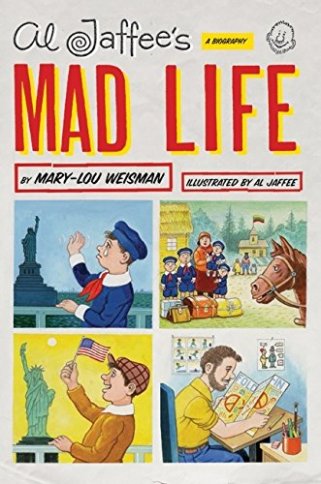
MJ: You were born Abraham Jaffee. How’d you end up as Al?
AJ: During World War II, there were a lot of anti-Semitic feelings, even among our own soldiers. I had very good friends in the Army who refused to even call me Abe—they would call me Al for some reason. There were also lot of jokes about “Abie and Sadie,” this [fictional] Jewish couple who could get extra ration coupons, could get tires for their car if they needed it—there was strict rationing at the time. I think the whole thing stemmed from the fact that the US was involved in a war against Hitler. So I think simplistic minds very easily put it together that I’m in this goddamn Army where I don’t want to be because I have to go fight Hitler for the Jews. I heard words to that effect by many soldiers.
MJ: Did comics save your hide?
AJ: Sometimes fate has a role in your life. I met a young soldier whom I befriended and took out for dinner one night. He said, “I’ve been admiring your artwork. Wouldn’t you like to do something like that while you’re in the service?” And I said sure. (As if I wouldn’t want to be an artist instead of a machine-gunner!) Subsequently, I wound up as an art instructor at a rehabilitation center in Coral Gables, Florida. I learned much later that this young man’s brother-in-law was a major. He could send people anywhere he wanted, so he just looked up to see where an art instructor was needed and sent me there. I was sent eventually to the Pentagon, where I worked for Colonel Howard Rusk—who later created a world famous rehabilitation center. And I did all the pamphlets and illustrated posters.
MJ: And your name also caused you problems as a kid in Lithuania?
AJ: In Yiddish, the word aberhemd meant outerwear, and unterhemd was underwear. My mother would shout “Abraham,” and it sounded to them like she was calling aberhemd. So the kids would chant “Aberhemd, unterhemd!” They got a good kick out of it.
MJ: I’m sure you didn’t.
AJ: Growing up in Savannah, Georgia, so many, many years ago, the Civil War was still being fought by a lot of people. They hated Abraham Lincoln, so I was kinda tagged with that, and the kids made fun of me. And then I go become “underwear” in Lithuania. And when I come back to North America, I’m linked with Abie and Sadie, the supposed wartime cheats. But I had no intention of changing my name, except I met this soldier in the Pentagon, and he came to me and said, “I just changed my name!” His name was Livshitz. He hated Livshitz, maybe because of the sound, so he said, “Now my name is Lipton.” And I said, “What did you pay for that?” He said, “I didn’t have to pay anything because I’m a soldier.” So I said, “Well, maybe I’ll change my name to Allen.”
MJ: You had an unusually rough childhood, always moving and having to adapt to these crazy new situations. But wherever you went, your art greased the wheels. What if you hadn’t had that?
AJ: I would’ve had a hugely more difficult more time. When I fell in with every new bunch of children, the first thing I would start doing was drawing the well-known cartoons of that day, like “Maggie and Jiggs” [Bringing Up Father], and I would be accepted immediately.
MJ: You and your brothers ended up being very resourceful. Was that due to your mom’s neglect?
AJ: Oh, yes, she left us on our own so much. We arrived in Lithuania when I was six. I would say by the time I was seven I was totally independent, getting up every morning and just heading out. And, you know, we were finding fresh vegetables and fruit to eat, and we did all kinds of things that most parents would probably be shocked at. But somehow we survived.
MJ: In the book, you spoke of feeling neglectful of your own children—which I found surprising, given all your mother put you through. Were you more like her than you cared to admit?
AJ: Probably, but mainly because people tend to become what they were trained to be. My training was to be on my own. And then, when I had independence, it was a constant battle within me to figure out when am I on my own and when am I their protector and servant. And also the insecurity that my life engendered, especially as a freelance cartoonist, kept me in a constant state of anxiety as to whether I am going to be able to meet my financial obligations.
MJ: But I thought you were making pretty good money for the times?
AJ: No one knew that Mad was going to go on for 50 or 60 years. I figured, “All right, I’ll do the best I can with Mad for as long as it lasts.” When you live from freelance check to freelance check, your mind is always on “What’s the next piece I’m going to write, or draw, that’ll pay this month’s rent?” And so going out to play ball with my kids was a low priority.
MJ: You say you set out early on to prove that adults were full of shit. What led you to that conclusion?
AJ: It doesn’t take a brilliant mind to notice that adults are telling you what to do and then they do the opposite—I mean, I can’t recall every stupid thing that adults were doing when I was six or seven. Some of it was the religious restrictions, where there were certain things that you were allowed to do and certain things that you weren’t allowed to do, and I couldn’t make sense of those things.
MJ: And organized religion became one of your targets for satire.
AJ: I don’t have anything against organized religions, except when they engender hatred for other religions. A lot of that we see today, where the Muslims are against the Christians and the Christians are against Jews and the Jews are against Arabs—I mean, it just it goes on and on and on. I guess if they all followed the basic principles of their own religions, they would love everybody instead of hating half the world.
MJ: You went after Jesse Helms, too.
AJ: I went after Helms mainly because he was doing things that segregationists do. Any kind of liberalizing program that either Democrats or moderate Republicans would come up with, Helms would be against it. I was just poking fun at him: If I had a crowd scene and everybody is holding up something that says “Yes,” he would be holding up a sign that says “No.” I would inject him into scenes sometimes where he wasn’t even a main character, he was just one of the crowd, but he was standing for something that was opposite of what the rest of the group was standing for. That’s the way I saw his actions in Congress. And Strom Thurmond. Anti-civil-rights politicians were fair game, simply because I didn’t agree with them. But I happened to have the pen, and I was drawing the cartoon, so I could do what I wanted.
MJ: The time when you were in New York City, working for Timely Comics and Stan Lee, was an incredible period for comics. Did it feel like it at the time?
AJ: It was what they eventually started calling the “golden age” of comics, which stretched into when the superheroes became really big with people like Jack Kirby who became giants in the business. I was a small cog. To begin with, I limited myself to humor, which was on the low rung of the comic business. The real popularity of comics was with the guys who could really draw well, like Kirby and the people who did Superman and Captain America and the Human Torch and [Namor] the Sub-Mariner—and the Spirit, by Will Eisner. All those features had beautiful drawings and they were very appealing. I mean, I loved them. Batman was beautifully done. I was doing things like Ziggy Pig and Silly Seal and Super Rabbit, and then I gravitated towards teenage stuff like Patsy Walker.
MJ: Tell me about Inferior Man.
AJ: When I got out of high school, I was casting about, and I figured I can’t get a job anywhere during the Depression—very difficult—and there was also a certain amount of anti-Semitism. The ad agencies tended to be lily white. And so, comic-book industry to the rescue, because it was created by Jews and a lot of the publishers were Jewish and a lot of the cartoonists who were flocking to it were Jewish. I decided I want to get into it, but I can’t draw like Superman. I’ll do the opposite. I’ll draw like Inferior Man. And I made a drawing of Inferior Man with a couple of monsters that he might be fighting—and a friend of mine said, “Why don’t you take that up to Will Eisner? He’s hiring.” I went up there, and Eisner was intrigued by Inferior Man, and he hired me on the spot. Ten dollars a week, which was a fortune! A subway fare was only five cents. And there, I met Dave Berg and a number of other people that I would know through the years. And that’s how I got my start. Unfortunately, because the war was on, Eisner—whom I respected enormously—said to me, “Why don’t you put Inferior Man in the Army. He’ll be a nondescript soldier by day and a superhero by night.” I always did whatever an editor told me to do, so I did it. But I just couldn’t make it work. Within a couple of months, it just wasn’t going anywhere. That’s how I moved on to Stan Lee.
MJ: What was your process for fleshing out ideas? You acted them out?
AJ: Almost every cartoonist, when he’s sitting down to draw a funny face, if you watch him closely, his mouth is gonna curl to the expression that he’s drawing. But when I would write a story—I know it’s going to sound almost ridiculous and infantile—I would, in a way, start living it. Stan Lee gave me this feature to do about two policemen, Squat Car Squad. I made one tall thin policeman, one short fat policeman. As I would give them dialogue, if it was the little short fat one, I would scrunch down as I’m drawing and I would sort of be him. I wasn’t aware of it, by the way. But I know it’s true because everyone that’s ever watched me drawing through the years has noticed that and has told me about it. Maybe it’s a way of injecting some life into these static characters.
MJ: You’ve invented a lot of little shticks that ended up being repeated, and over the years you’ve put out more than 50 books worth of your stuff. What’s your proudest satirical creation?
AJ: It’s easy to pick something that has become very popular, like, say, Snappy Answers to Stupid Questions. That sold a lot of books and I enjoyed doing them, although I must confess that I had certain deep-down misgivings, because I wouldn’t behave the way the characters behaved in Snappy Answers. If there’s a big sign that says “Bus Stop” and some little old lady comes up and says, “Excuse me, does the bus stop here?”—well, in real life I would never give her some smart-ass answer. My favorite book actually was the Mad Book of Magic [and Other Dirty Tricks]. I think it had a lot of—even if I say so myself—clever satirical takeoffs on the tricks that magicians on stage perform, and also the magic puzzles that people produce on puzzle pages for children and children’s books. To me, that was the most fun.
MJ: I used to like the Mad inventions. Were you inspired by Rube Goldberg?
AJ: I can’t see how I wouldn’t be inspired by Rube Goldberg, because when I was a kid, I used to receive it in Europe. When I came back to the United States, I followed his work up until the time he stopped doing them. Especially his inventions in Liberty magazine I remember. I did not deliberately set out to become another Rube Goldberg; I just happen to enjoy his stuff enormously. Maybe I would have done it if he never existed, and maybe I’m doing it because he entered my subconscious and pushed me in that direction.
MJ: You followed Harvey Kurtzman from Mad to Trump to Humbug even though he was a terrible businessman. Why not go the safe route?
AJ: I loved Harvey and I miss him to this day. He was a very, very inspiring guy. He was inventive and inspiring and he also was just a scrupulous editor. He could catch things that most people would just say, “Let it go through, it really doesn’t matter; who’s going to know?” But once Harvey pointed it out, I would change it even if it took me the whole day. Harvey knew how to make things work because he wasn’t greedy, he wasn’t successful.
MJ: Well, that’s always the problem with art, isn’t it?
AJ: It is. If one of our magazines was late because one of the artists had a problem in the family and couldn’t finish the piece on time and offered to just knock it out any old way, Harvey would say, “No, no, no, no. I want it done right. Do it when you feel better and we’ll just delay the printing.” Well, you can’t do that in business. It shoots up the costs of doing the job, and there are complaints all up and down the line. Harvey was sort of like my mother: She disregarded train schedules. She didn’t realize that when the train came into the station, you’re supposed to be ready to get off—not tell the conductor to be quiet because one of your kids is still sleeping.
MJ: You started doing fold-ins the year before I was born, in 1964, and you’re still doing them, right?
AJ: Yeah, I guess I’ll keep doing them as long as I’m alive. With the fold-in, I’ve finally become secure in the knowledge that the people at Mad regard it as an iconic piece in the magazine and they want it to go on for as long as I can go on.
MJ: I haven’t read Mad since I was a kid. How does the current version compare?
AJ: The old version was easier for me to work in, because they did a lot of repeat articles like, “Don’t You Hate Christmas?” and then you do a lot of funny stuff about Christmas. I could keep coming back to Snappy Answers every six months or so. But now they decided that they have to be more on top of the news. They are also employing a lot of young cartoonists, like Johnny Ryan and others, who are very popular in alternative comics. There are things in it that don’t appeal to me simply because I’m too old—references to new music groups, for example, that just go over my head. But I do read each issue cover to cover, and I think it is still a very good package.
MJ: Would the humor from Mad‘s heyday sell today, or are kids too sophisticated?
AJ: I know that they are more bombarded. When Mad first started, I did an article called “Egoboosters.” One of my ideas was to find an old telephone and put it in your car, and when you pull up next to somebody at a stoplight, push a button to make it ring, and pick it up and start talking into it. People will be so flabbergasted that your ego will soar. So, how are you going to impress a kid today? Any kind of invention that I could come up with will be here tomorrow—I’m talking about a crazy invention like a telephone in your car! So, the kids of today are too sophisticated for the Mad of 25 years ago. When Mad first came out, in 1952, it was the only game in town. Now, you’ve got graduates from Mad who are doing The Today Show or Stephen Colbert or Saturday Night Live. All of these people grew up on Mad. Now Mad has to top them. So Mad is almost in a competition with itself.
MJ: You say you are still trying to prove adults are full of shit. What gets you worked up these days?
AJ: You could walk up to somebody and say, “What would you think if we made the air clean that we breathe?” and that person could turn around and say, “You want me to lose my job?” I mean, we are polarized. Any improvement you want to make—in health care, in air quality, in preventing global warming, turning things green—you are going to find an equal number of people who are against it without knowing why. A satirist’s job is impossible today. A teabagger who would tune into Stephen Colbert would accuse him of being a communist.

